Hidden in Plain Sight

The humble greatness of Rebbe Chai Yitzchok Twersky of Rachmistrivka-Boro Park
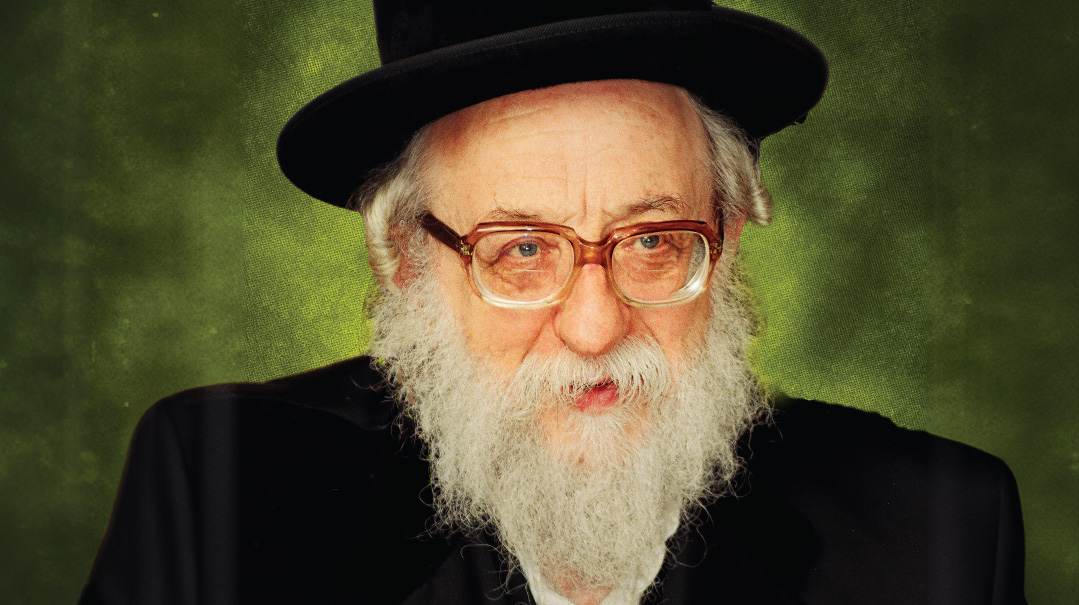
Photos: Mattis Goldberg, JDN, Rachmistrivka archives
He never wanted to be a rebbe, and even when coronated against his will, he chose the most anonymous location for a beis medrash. Yet no matter how much of a “gornisht” Rebbe Chai Yitzchok Twersky ztz”l of Rachmistrivka-Boro Park wanted to make himself, the public flocked to him as if his very humility were a magnet, his impeccable middos and devotion to Torah and emes the glue for his chassidim. This week they’re in mourning. Next week they’ll strengthen themselves with the very lessons he taught them
“Zichron Moishe,” the Rebbetzin would say.
Yet she didn’t mean the shul, but the mindset, the neighborhood, and most of all, the pure simplicity of its people.
“My husband,” the daughter of Rav Yaakov Yosef of Skver and wife of the Rachmistrivka Rebbe would say, “wants to retire and go back home, to sit and learn in Zichron Moishe.”
But the Rebbe, who had been whittled out of the streets of Yerushalayim, was destined not just to live in America, but to rest there as well, a brand new beis hakevaros inaugurated last week for his kevurah. He did not leave America, because when, before his own chasunah, he asked his rebbe, Rav Aharon of Belz, for a brachah that he merit returning to the Holy City, the Belzer Rebbe said, “Yes, mit Mashiach in einem — together with Mashiach.”
The chassan understood and accepted the Rebbe’s words.
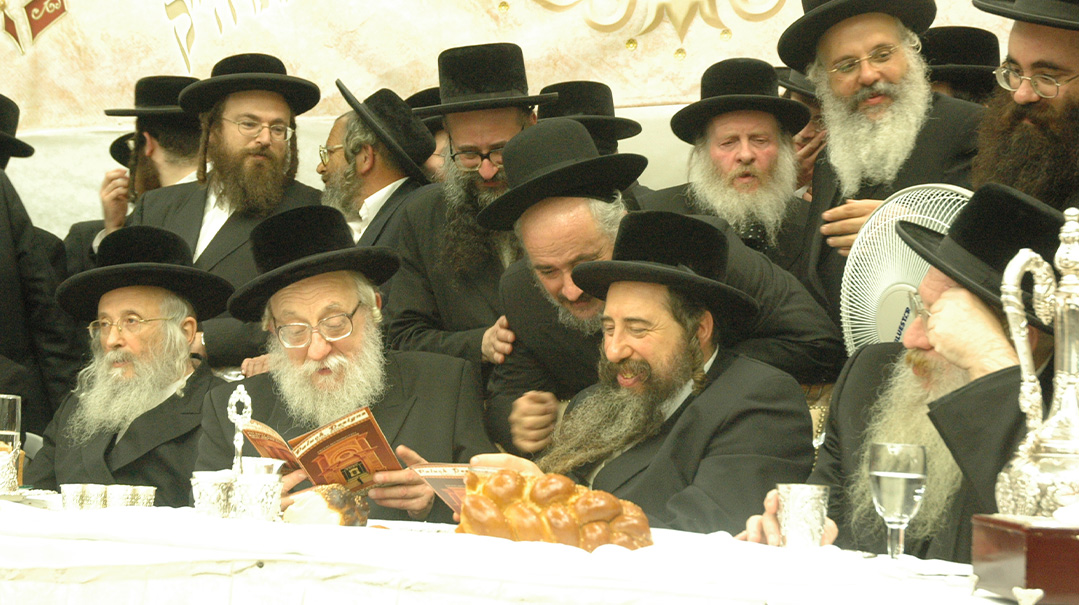
The Rebbe, who had been whittled out of the streets of Yerushalayim, was destined not just to live in America, but to rest there as well, a brand new beis hakevaros inaugurated last week for his kevurah
B
orn in 1931 to Rav Yochanan and Esther Rivkah Twersky, baby Yitzchok merited having his great- grandfather, Rav Nochum’che of Rachmistrivka, serve as his sandek. He was named for his ancestor, Rav Itzik’l of Skver, and raised in the shadow of the elter-zaide: In a city of great people who made little of themselves, the Rachmistrivka court had made this the overarching goal, to reach for pure pashtus.
Before his bar mitzvah, young Itzik’l took seriously ill, and his grandfather, Rebbe Duvid’l of Rachmistrivka, added the name Chaim. Chaim Yitzchok experienced a recovery that appeared miraculous, but in the turmoil, no one had realized that his younger brother was named Moshe Chaim.
The Zeide made a slight edit, modifying Chaim to Chai — saying that as eineklach of the Chida, they were blessed with a Sephardic heritage too, and the name Chai, used in the Sephardic community, carried the same auspiciousness. And so, Chai Yitzchok prepared for his bar mitzvah.
It was considered to be not just a seudas mitzvah, but also a seudas hoda’ah for the miraculous recovery. At the simchah, a conversation ensued between the tzaddikim at the head table, within earshot of the bar mitzvah bochur. “I brought the bar mitzvah bochur the gift of a Kli Yakar,” the Rebbe of Boyan-Leipzig told his cousin, the Rebbe of Husyatin, “because the bar mitzvah bochur is a kli yakar.”
When asked about the comment later in life, the Rachmistrivka Rebbe would say, “Yes, everyone knew that I had been so sick, so they were trying to be mechazek me.”
It was not the only indication that the bochur was exceptional.
Rebbe Ahrele Belzer had the custom of shaking hands through a towel, but when Itzik’l, grandson of the Rachmistrivka Rebbe, came in, the Rebbe would take his hand.
Like generations of Yerushalmi bochurim, Itzik’l took his place on the worn benches of Yeshivah Eitz Chaim. There, he found his rebbi. Rav Isser Zalman Meltzer had brought the lomdus of Lita up to the Holy City, and in Eitz Chaim, the young men immersed themselves in his shiurim and approach to the sugya.
The purity of a rebbishe kind, the lomdus of a talmid of the Even Ha’azel… but it was all wrapped up in the pashtus of Rachmistrivka, so little was made of it.
Later, Rebbe Aharon of Belz would personally involve himself in the shidduch between the Rachmistrivka bochur and his own cousin Miriam Twersky, the daughter of Rav Yaakov Yosef of Skver — in faraway America.
Very far away.
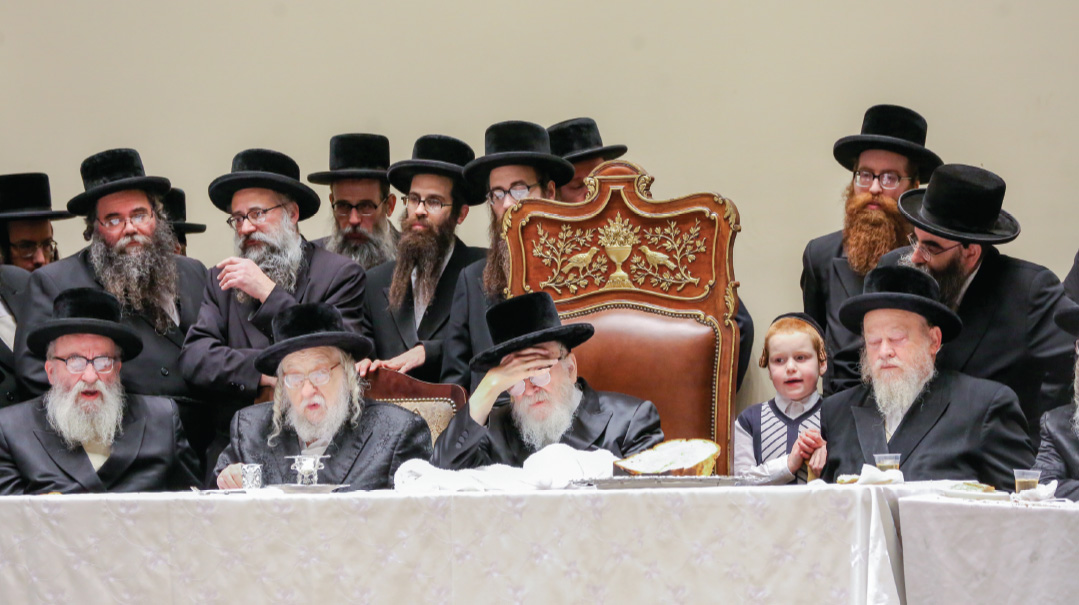
For years after his marriage, Reb Itzik’l played an elusive supporting role for his father-in-law, Rebbe Yaakov Yosef of Skver, yet when the Rebbe was niftar and his son Rav Duvid took the helm, Reb Itzik’l became a staunch chassid to this younger brother-in-law.
T
he Skverer Rebbe’s new eidem settled in Williamsburg in 1954, two years later joining his father-in-law in trying to recreate the purity of the shtetl in New Square.
The Skverer Rebbe, to whom chinuch in this new village was not just a necessity, but the goal of everything, entrusted his son-in-law with overseeing the mosdos of chinuch.
Somehow, recall New Square old-timers, Reb Itzik’l managed the ultimate Rachmistrivka moifes — he did so much, but took up no space at all. To the maggidei shiur in the yeshivah, he was the talmid chacham who understood them; to the simpler Yidden who burned with erlichkeit, he was a shtetl Yid who respected their old-time passion, and to each, he was a friend — kind, gentle, humble, and so good-humored.
Yet he missed Eretz Yisrael fiercely, the letters between him and his father telling of his relentless, perpetual longing for home. In a letter dated Lag B’Omer, Reb Itzik’l writes of the picture in his mind’s eye, the image of “how right now, you must be getting ready to leave for Meron, hearts racing with excitement.”
The letters home kept the son connected, but his father urged him to appreciate his own surroundings. In response to a question regarding a particular minhag, Rav Yochanan of Rachmistrivka wrote to his son, “In this regard, you should follow the path of the one whom you live near.”
So Reb Itzik’l drew even closer to his father-in-law, absorbing the minhagim and mesorah of that chassidus and becoming “a bit Skver” — this too incorporated without fanfare into the earnest, simple authenticity of Rachmistrivka.
He would daven for the amud in Skver on the Yamim Noraim, and he stood at the helm of the mosdos chinuch. He guided the yungeleit in the sugyos of Shas and the sugyos of chassidus, but at the tish, he sat like a chassid before his father-in-law, as if desperate to receive.
(The Skverer Rebbe did not write or publish his Torah, and eventually, much of it would end up in the Rachmistrivka Rebbe’s Amaros Tehoros.)
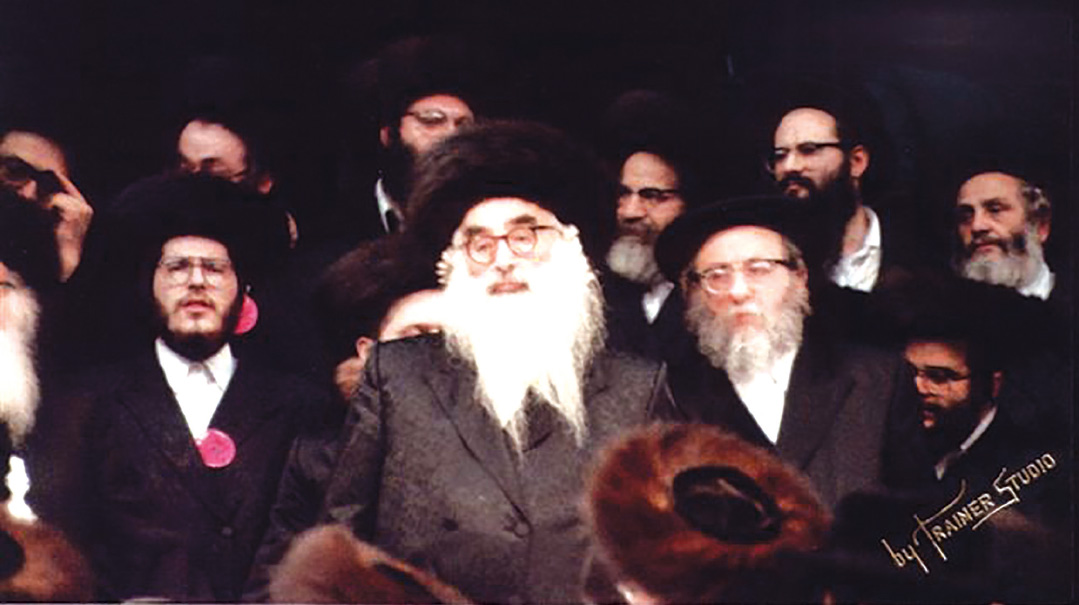
With Rebbe Yaakov Yosef’s elder son-in-law, Rebbe Mottele of Vizhnitz-Monsey
A
fter Rebbe Mottele Chernobyler was niftar in 1837, his son, the first Rav Yochanan of Rachmistrivka remarked that he had hoped to receive his father’s middah of “gurnisht,” his ability to make himself as nothing, as a yerushah. However, it was not available, as his brother Rav Moshe of Korastchev had taken it. “In that case,” Rav Yochanan concluded, “there is only gurnisht mit gurnisht left for me.”
Over a century later, in 1968, the Rebbe of Skver was niftar and it was then that Reb Itzik’l performed what may have been his greatest moifes yet. Reb Itzik’l had the opportunity to claim his ancestor Rav Yochanan’s yerushah, working not just to be nothing, but to make it as if he did not exist at all. His brother-in-law had been crowned as the new Skverer Rebbe and his father’s court was in Yerushalayim, so in tiny New Square, Reb Itzik’l saw the opportunity to don the cloak of the poshuter Yerushalayimer Yid he aspired to be.
He devoted himself to the leadership of the new Skverer Rebbe, younger than he. He sat by his Gemara, hour after hour, toiling in Torah with the joy of a young bochur just discovering its sweetness. He listened to Yidden — not as a rebbe, but as a friend, his blue eyes sparkling with joy at their good news and brimming with compassion at their struggles.
Until 1982, it worked. But then his father, Rebbe Yochanan, was niftar.
At the levayah, Rav Avrohom Yehoshua Heschel Twersky of Machnovka, the senior rebbe in the Chernobyl dynasty, announced that the oldest son, Rav Yisrael Mordechai, would succeed his father in Yerushalayim. When Reb Itzik’l, the second son, arrived from America following the shivah, the Machnovka Rebbe announced that he would serve as Rachmistrivka Rebbe in America, “whether he agrees or not.”
Rebv Itzik’l insisted that he could not accept the role, telling the Machnovka Rebbe that he couldn’t read a kvittel. “You? Where did you grow up, in the forest?” the Machnovka tzaddik countered. “You, whose eyes saw the elter-zeide Reb Nochum’che, who grew up by the zeide Reb Duvid’l? A son of Rav Yochan’che and an eidem of the Skverer Rebbe? You can read a kvittel.”
Reb Itzik’l protested that he still had children at home, and it was not fair to them. “How did your father’s children turn out?” asked the Machnovka Rebbe, and with that, the conversation ended.
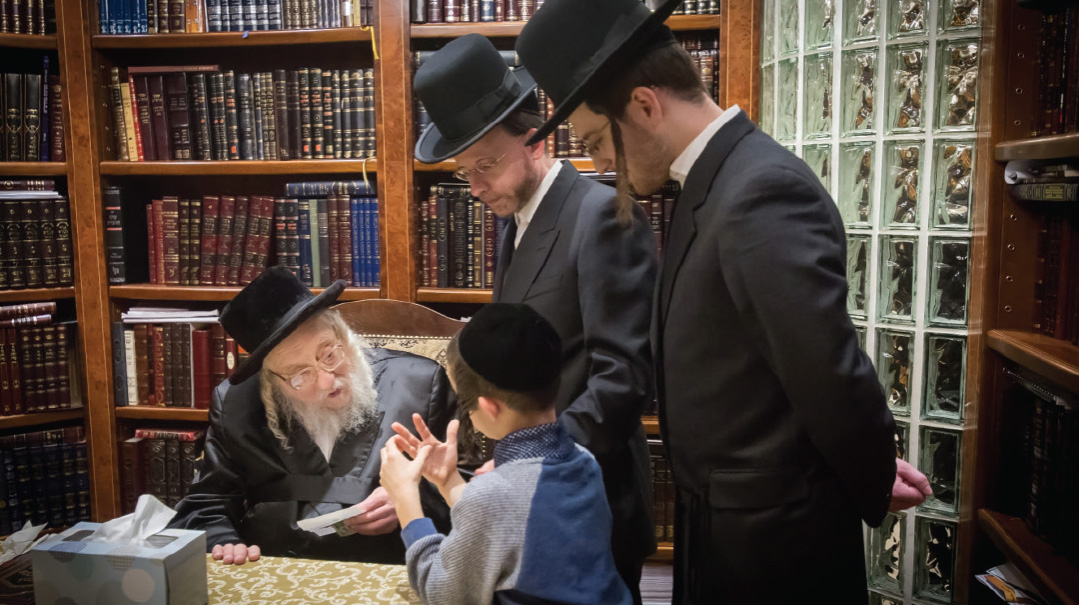
The Rebbe refused to post hours for kabbalas kahal, because everyone was welcome. When they’d refer to him as “Rebbe,” he’d just wave it away with his hand, bringing the pashtus of Yerushalayim’s alleyways to the streets of Boro Park
A
new American court was established, that of Rachmistrivka, in Boro Park. The new rebbe decided that 45th Street, between 12th and 13th Avenues, was the perfect place for this new chassidus, because this way, he could blend in with the scenery and remain unnoticed.
Most of the people couldn’t even pronounce “Rachmistrivka,” and this new court had no director of marketing.
There was nothing to brand it. They did not come forth with miracle stories, the Rebbe did not do without food or sleep, nor did he stress a different way in learning or avodah.
What he did do was learn, daven, reflect impeccable middos, and listen to Yidden. The new Rebbe did not allow for formal kabbalas kahal hours to be posted, so people came whenever it suited them. When some sort of schedule became necessary, the Rebbe agreed to a sign, but only one that listed when it was open — not one that said when it was closed.
The chassidus did not explode, and it did not flourish. Many of the regulars were chassidim of other courts. They came to Rachmistrivka not for an identity or social reasons, but only because they were drawn there.
Drawn by the purity. Drawn by the sincerity. And drawn by the humility.
The Rebbe himself did not seem to grasp the realities of the position. Shacharis at Rachmastrikva was at seven-thirty in the morning, because at Beitch, down the block, there was already a seven o’clock minyan.
The Rebbe started to daven at the second minyan, at eight-thirty, a change from his practice of davening early. The gabbai tried to figure out why, and he realized that the Rebbe had the custom of learning through the night and only going to sleep near dawn. The Rebbe found it difficult to arrive precisely at seven-thirty after barely two hours of sleep, so eight-thirty was his next option.
“We’ll just move the 7:30 minyan up to 7:45 to accommodate the Rebbe,” the gabbai told the Rebbe, who refused to consider inconveniencing others for the sake of his own schedule. The gabbai explained that there was no seven-thirty minyan — it was the Rebbe’s minyan, comprised of people who specifically wanted to daven with the Rebbe each day, regardless of the time — and only then did the Rebbe agree.
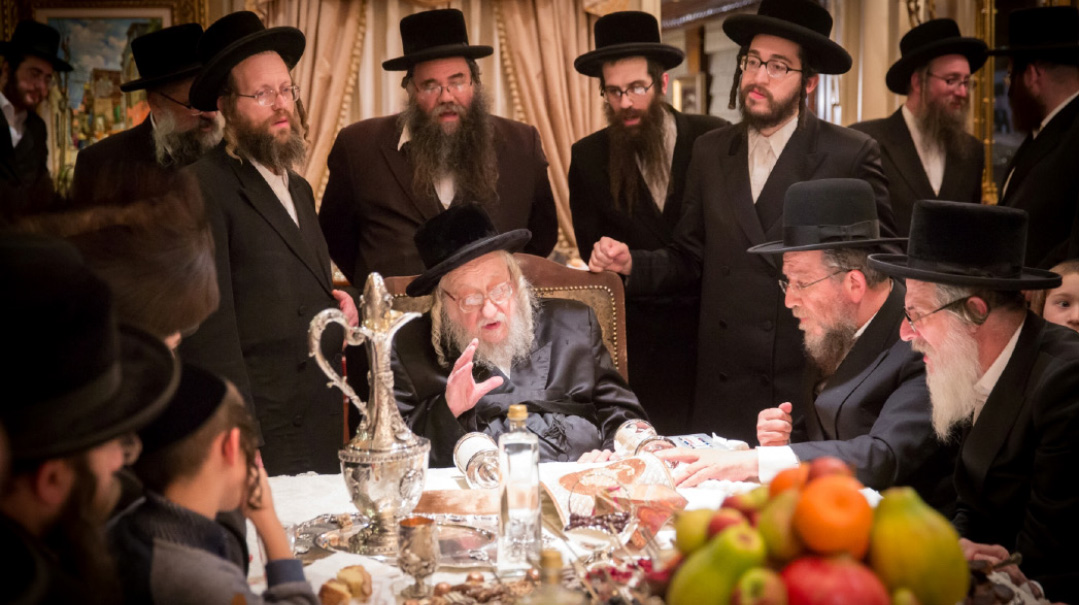
W
hen he led the tish, it was as if this was a chaburah, like-minded people working toward a common goal, and he was the elder, sharing Torah and stories from other tzaddikim, perhaps elaborating or expounding on a point.
Though the Rebbe suffered from a speech impediment, the clarity of his ideas compensated for whatever challenges the stutter presented.
A bochur from a local yeshivah came in to the room, confiding in the Rebbe about how he had stumbled in the face of temptation.
The Rebbe did not reprimand and he did not shout. He smiled.
“Yes,” said the Rachmistrivka Rebbe as he pointed to the waiting room, “all those people too, it is part of what it means to be a human being. The yetzer hara is very strong, but this is the reason we are here, why Hashem made us. To show that we are stronger. For you to show that you are stronger!”
This was his central message, and he conveyed it not by speaking, but by working. The yetzer hara is real, ratzon Hashem is real, and the job of an erliche Yid is to help one triumph over the other.
Even as he exuded joy, the humor and sparkle of Zichron Moshe evident in his conversation, he carried the weight of a baal mussar, one accustomed to considering every decision.
As he aged, he did not fast on the days of Behab (the Monday, Thursday and Monday at the beginning of the months of Cheshvan and Iyar, considered to be times of atonement for any lightheartedness over the days of Yom Tov), but he did have a minhag not to eat chicken or meat on those days.
He was once at the home of his daughter during that period, and she prepared supper for him, which included a dish of fish balls coated in bread crumbs. He contemplated the plate for a moment, and then ate.
After supper, the gabbai brought the Rebbe his usual cup of coffee, but the Rebbe said that he was fleishig, so he could not drink it.
“Rebbe, that was fish, not chicken, of course your daughter knows not to serve fleishigs on the days of Behab,” the gabbai explained.
A flash of understanding crossed the Rebbe’s face. “Ah, it was fish,” he said, “ahhh… very good, baruch Hashem.”
He had not been sure what to do, he confided in the gabbai. On one hand, he had a minhag, but on the other hand, his daughter had already prepared the dish. How could he hurt her feelings?
The gabbai listened in wonder. The Rebbe’s minhagim were sourced in holiness, not mere practices he had picked up along the way, and the cook was his very own daughter (Rebbetzin of the current Rebbe of Vizhnitz-Kiamesha), who would have been thrilled to accommodate him and prepare something else — and yet, the Rebbe had eaten the dish, reasoning that a personal chumrah is not an excuse to cause pain to another Yid.
The situation resolved, the gabbai left the coffee on the Rebbe’s table. It was only later that he realized that the Rebbe never did drink the coffee, leaving it untouched — the hava amina that it had been forbidden to him enough to make it so.
When people would refer to the Rebbe, he would mumble, “Oich mir a Rebbe,” waving his hands dismissively. A chassid once brought his son to Rachmistrivka so that the Rebbe might lay tefillin on the boy for the first time, saying that the bochur would be wrapping the tefillin in accordance with the Rachmistrivka minhag.
The Rebbe looked at him in surprise. “But you have a family minhag! I would not be pleased if my einekel changed our family minhag just because some rebbele suggested it!”
It was how he saw himself, and how he would see himself until the end.
The crowds grew, the small beis medrash no longer able to hold them. For the Yamim Noraim, a nearby hall was rented to accommodate the large crowds and eventually, a new, larger beis medrash was constructed.
But the veteran chassidim noticed that the expression of the Rebbe’s face had never changed, his bearing and conduct precisely the same when he faced a crowd of hundreds, full bleachers reaching the ceiling, as when he had sat in the old shul with 20 people around the table.
The spacious new beis medrash was filled to capacity on that that first Rosh Hashanah after its completion. As the Rebbe prepared for tekios, the gabbai happily reminded him that there was a brand new mikveh downstairs, and there was no reason to walk back to the old beis medrash to toivel.
The Rebbe thanked him, but chose to go back to the old mikveh during the break, stopping in his apartment upstairs from the old beis medrash. The elder chassidim speculated about what possible kavanos their Rebbe had in immersing in the old mikveh rather than the new one.
One of them could not contain his curiosity, and he asked the Rebbe what the cheshbon had been. The Rebbe smiled and explained that in the morning, the Rebbetzin had mentioned that one of the pots on the stove needed to be removed from the fire during the day, and she would have to leave shul to perform the task. The Rebbe assured her that she could remain in her seat in shul, since he would be going home to use the mikveh.
He went home and removed the pot from the fire, toiveled, and then went to blow shofar.
The humility and ayin tovah fused when it came to his older brother, the Rebbe with whom he shared the mantle of leadership (Rachmistrikva batei medrash featured the words, “B’nesius Ho’admorim shlita — under the leadership of the Rebbes,” on the sign outside).
The first young men of the American Rachmistrivka chassidus went off to learn in Eretz Yisrael. “Go meet my brother,” the Rebbe suggested, as if to say, “that is a real Rebbe.”
Many of them did, a chaburah of American chassidim remaining there and ultimately building the new beis medrash for that chassidus.
The Boro Park Rebbe was thrilled at the development, sharing his pleasure with them when he visited Eretz Yisrael: They had been fortunate enough to connect with a tzaddik.
When Rav Yisroel Mordechai was niftar in 2004, his son Rav Duvid took over, and Rachmistrivka continued to be led by both rebbes in tandem.
The Yerushalayim Rebbe visited America, and he was meant to lead the tish together with his uncle. Instead, he sat as a humble chassid until his elderly uncle and host left the tish to go home. Only then did he begin to speak and lead zemiros. As he reached home, the Boro Park Rebbe turned to his attendant and said, “Thank you for helping me get home, but now, hurry back to the beis medrash. You are so fortunate. I wish I still had the energy to join a tish by this Rebbe….”
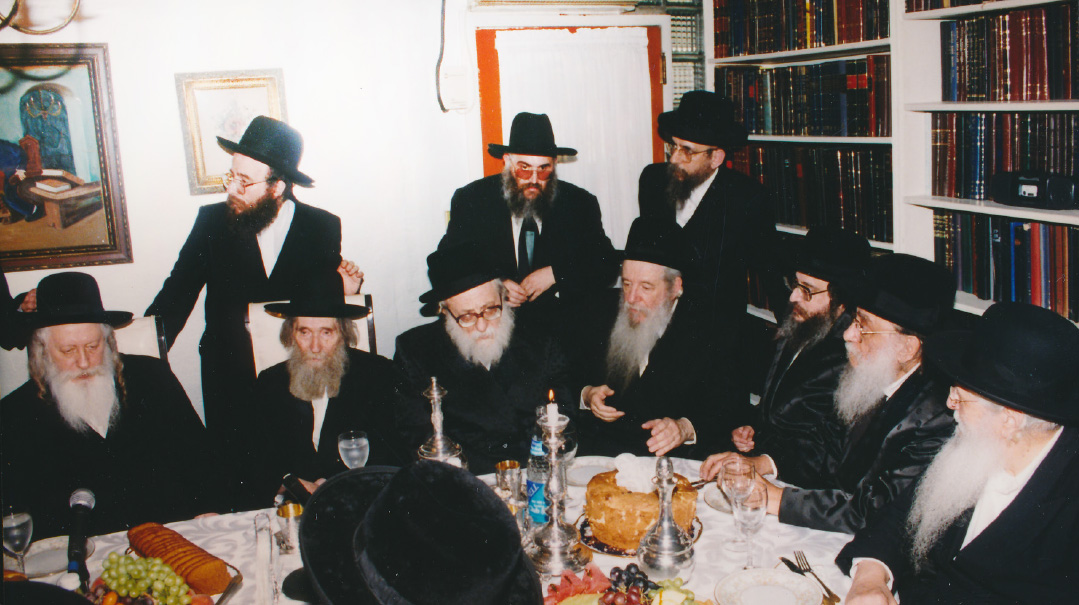
Flanked by the Gerrer Rebbe and Rav Steinman on their historic combined visit, the Rebbe felt a touch of home
T
he Rebbe’s eldest son, Reb Mordche, had fulfilled his father’s dream and settled in Yerushalayim. A son-in-law of the Rebbe’s older brother Rebbe Yisroel Mordechai in Yerushalayim, Reb Mordche was a gaon in Torah and chassidus.
One Shabbos during Shalosh Seudos years ago, he collapsed suddenly, and by Motzaei Shabbos, he was gone.
The Rebbe was bound heart and soul to his son, and he was shattered by the loss. At the close of the shivah, the bereaved father flew to Eretz Yisrael to be with his newly orphaned grandchildren. Surrounded by chassidim and family members, the Rebbe approached the fresh grave of his son, and said Kaddish with no visible emotion.
The Rebbe’s mother, still alive at the time, was surprised. “Are you so cold that you cannot show emotion at the kever of your son?” she asked.
He wanted to, he explained. He had so much wanted to let those tears fall on the fresh grave. But he had spent a week listening to Yidden comfort him among the aveilim of Tzion and Yerushalayim, reminding him that his pain was but a drop in the ocean of suffering of a displaced nation.
“When I came to Mordche’s kever,” he told her, “I looked across Har Hazeisim and saw the desolation and ruin of the Ribbono shel Olam’s home — Mammeh, how could I cry about my own pain when I saw that?”
This was the Rachmastrivka objective of gurnisht mit gurnisht — the humility to accept the decree with perfect faith, and then the added layer of humility to hold back the tears longing to flow free.
For months after the loss his son, the pain was etched into his face. He showed chassidim that he was not made of stone. But he also showed them that a person could strengthen himself and rise above the pain, the sparkle in his eye and smile on his lips returning once more.
No, he was not made of stone, and it was because of that that he could teach them — human beings just like him — how to soar.
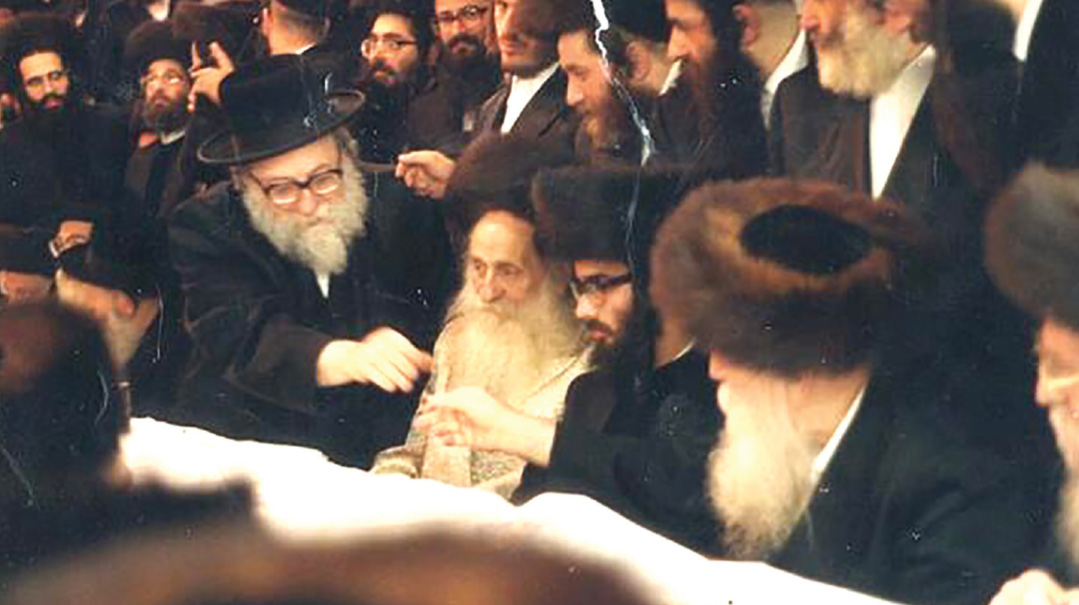
He was above politics and alliances, so he belonged to everyone and no one. With the Beirach Moshe of Satmar
T
he chassidus continued to grow and eventually, it became clear that the kehillah needed mosdos of its own, culminating with the creation of a yeshivah gedolah.
A group of askanim came to ask what the new yeshivah should be called. The Rebbe considered the question, and the entourage waited, wondering to which of his ancestors the Rebbe would pay tribute.
“Eisek HaTorah,” the Rebbe finally said. Not even “Ahavas Torah” or “Cheishek HaTorah,” but simply, “Eisek.” The talmid of Rav Isser Zalman wanted this of his own talmidim — that they sit and toil in learning.
That was the name he selected for his yeshivah, for this was the thread that was the constant throughout his life, from the earliest days in Eitz Chaim until the very end.
Eisek — work, and Torah.
Like the Torah itself, all his paths were peace and all his ways were pleasant, and like the Torah, the blessings were not a story in their own right, but part of life in Rachmistrivka.
The product was not salvation and he was not the vendor: The product was ratzon Hashem and he was right there, working alongside the people to fulfill it.
Like the Torah, he belonged to no one, beyond and above politics and alliances, and like the Torah, he belonged to everyone, accessible to any Yid and every Yid.
T
he Rebbe was ill for the last few years and was niftar last week, on the 29th of Av. The Midrash points out that Moshe Rabbeinu, who claimed not to be an ish devarim, hampered by a speech impediment, parted from us with “Eileh hadevarim asher diber Moshe — these are the words that Moshe spoke.”
Forty years ago, they couldn’t pronounce Rachmistrivka, but now, the world mourns his petirah. Then, they did not know who would form his minyan, and now, the seforim of the Rachmistrivka Rebbe have become classics, quoted and learned by contemporary rebbes and mashpiim and learned in their yeshivos, going from one printing to another.
How?
The answer lies in their title. Amaros Tehoros. Pure words.
In a world of sullied waters, the waters of Rachmistrivka were so pure. In a world where people are longing for something real and true, this Rebbe welcomed them and allowed them to touch it.
He was a rebbe with a pure smile, pure eyes, and pure heart, a rebbe who allowed people to come in and realize that they were pure all along.
(Originally featured in Mishpacha, Issue 975)
Oops! We could not locate your form.







